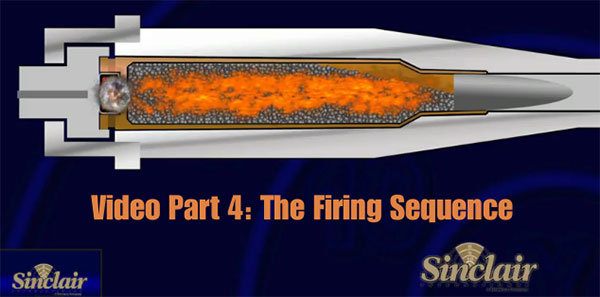Learn Basics of Reloading Process with Sinclair Int’l Videos
Sinclair International has created a series of instructional videos illustrating the basics of metallic cartridge reloading. The 8-Part series starts with reloading basics and provides step-by-step, how-to instructions that will help new reloaders get started. Detailed, animated illustrations show you what happens inside the chamber when shooting, and inside the dies during each step of reloading. The videos can be viewed on Sinclair International’s YouTube channel. Shown below is the first video in the series:
Each of the Sinclair videos is hosted by then Sinclair Int’l President Bill Gravatt (now with Creedmoor Sports). Bill doesn’t just show you “how”, he tells you “why”. The how-to segments cover case inspection, proper die set up, case sizing, primer installation, powder measuring, bullet seating, crimping, and even goes into the record keeping needed for the handloader. “We wanted to give shooters who haven’t reloaded a look at all the advantages of creating your own ammo and how easy it is to get started,” said Gravatt, “without telling them they had to have any certain brand or type of equipment to do the job.”
The Eight Video Topics Are:
| Part 1 — Intro to Video Series Part 2 — Intro to Reloading Safety Part 3 — Metallic Cartridge Components Part 4 — The Firing Sequence |
Part 5 — Tools for Reloading Part 6 — Loading Bottle-Neck Cartridges (2 videos) Part 7 — Loading Straight Wall Cartridges Part 8 — Reloading Series Conclusion |
CLICK HERE to Watch all Sinclair Reloading Series Videos »
| Reloading Tools Shown below is Part 5 of the video series, covering the tools used for precision reloading. |

We also strongly recommend the Part 4 Video to readers who are getting started in reloading. This “How Things Work” segment covers the sequence of events inside the chamber (and barrel) when the cartridge is fired. The video includes helpful graphics that show what happens to the primer, powder, cartridge, and bullet when the round is fired. The video also illustrates “headspace” and explains how this can change after firing. We think this video answers many common questions and will help reloaders understand the forces at work on their brass during the firing process.
























